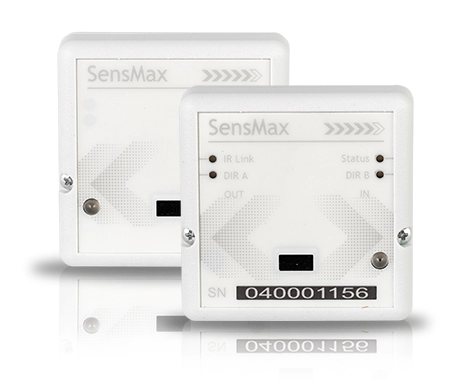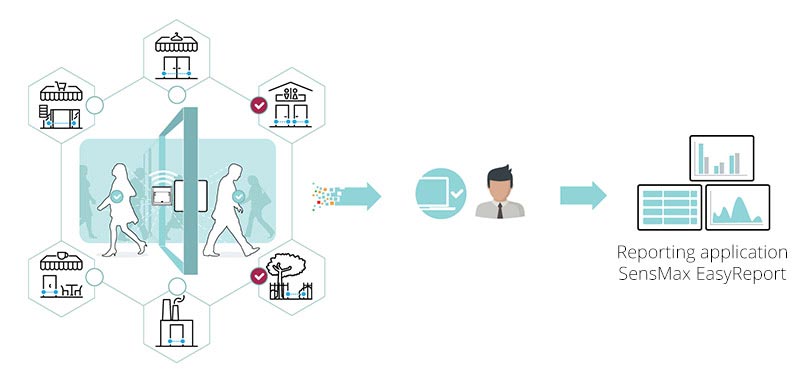SensMax DE Outdoor Infrared People Counting Sensor

- Operation principle:Infrared beam crossing
- Movement direction finding:Bi-directional
- Internal memory :150 days of hourly data
- Power supply:AA batteries
- Battery life:up to 1 year
Bidirectional battery-powered sensor with 1-year life and 150-day memory for parks, trails, and outdoor sites without electricity or internet.
SensMax DE Outdoor Infrared People Counting Sensor
The SensMax DE outdoor people counting sensor is a battery-powered pedestrian counter designed for areas without electricity or internet. Using three invisible infrared beams, this footfall counting sensor detects pedestrians passing through and records both IN and OUT directions, making it a practical solution for parks, trails, and recreational areas.
How It Works
The infrared people counting sensor consists of a transmitter and receiver installed opposite each other across the passage. When a person crosses, the beams detect the interruption and register a count with direction (IN or OUT). Data is stored in internal memory for up to 150 days. To retrieve statistics, a handheld reader (SensMax SE/DE collector) communicates with the sensor via IrDA at 1 m range. The collected data is then uploaded to SensMax EasyReport software, which merges new results with historical datasets to create hourly, daily, weekly, and monthly visitor flow reports.

Three infrared beams detect both directions and store counts in internal memory.
Installation & Privacy
Mount the pedestrian counting sensor at a narrow passage such as a gate, bridge, or trail section. Align transmitter and receiver across from each other at 1.5 m height. Use adhesive tape for initial alignment, then secure with the provided bracket and screws. Power is supplied by AA batteries, which last up to one year. For harsh environments, add the optional IP68 outdoor case to protect against rain, snow, and dust.
The outdoor visitor counting sensor is fully anonymous and GDPR-compliant — it does not capture or store images. Maintenance is simple: occasional battery replacement and periodic data collection with the handheld reader.

Mount across narrow passages; align beams for accurate IN/OUT detection.
Key Technical Advantages
- Bidirectional detection — records IN and OUT movements with three-beam infrared technology.
- Battery-powered sensor — operates up to 1 year on standard AA batteries.
- Offline data storage — internal memory holds 150 days of hourly statistics.
- Wireless installation — no cabling or IT infrastructure needed, quick to deploy in remote areas.
- Rugged outdoor design — optional IP68 case protects against dust, rain, and snow.
- Scalable collection — one handheld reader can download data from up to 99 sensors.
Real-World Applications
- Parks & recreation areas — measure visitor activity to improve maintenance and justify funding.
- Walking & hiking trails — track usage trends, schedule cleaning, and plan trail improvements.
- Tourist attractions — monitor seasonal visitor flows and adjust staff schedules accordingly.
- Public outdoor facilities — optimize cleaning services for toilets, picnic spots, and recreation zones.
- Transport crossings — count pedestrians on bridges, tunnels, or underpasses for safety and planning.
Business Impact
By recording both directions, the footfall counting sensor provides accurate statistics for managing resources. Municipalities and park authorities can plan staff schedules, cleaning, and repairs according to real usage, not assumptions. Seasonal reports help justify budget allocations and guide investments in infrastructure.
Because the infrared visitor counter sensor operates without electricity or internet, it is ideal for remote outdoor sites. Hourly data stored in memory ensures continuous reporting, even in off-grid conditions.
Example in Action
A hiking trail authority installed SensMax DE outdoor people counting sensors at two trail entrances and a bridge crossing. After several months, the data revealed that one entrance was used mainly for entry while another served mostly as an exit. By understanding these visitor patterns, the authority improved signage and adjusted ranger patrol routes, which reduced congestion at peak times and enhanced the overall visitor experience. The insights also supported better planning for parking and transport connections, helping the site handle growing tourist numbers more efficiently.
Get Started
Want accurate bidirectional pedestrian counts without electricity or internet? Request a demo or quote for the SensMax DE Outdoor Infrared People Counting Sensor today. Where to Buy
SensMax DE Technical Details
| Feature | Details |
|---|---|
| Application | pedestrian counting, outdoor people counting, footfall monitoring in parks, visitor statistics on trails, people counting in non-electricity areas, outdoor infrared people counting, outdoor bidirectional people counting in parks, pedestrian counting on trails, visitor flow statistics at attractions, occupancy monitoring in outdoor facilities, trail entrance monitoring, bridge and crossing pedestrian counts |
| Technology | Three infrared beams crossing (TX/RX pair) |
| Movement tracking | Bi-directional (IN/OUT) |
| Counting lines/zones | Three infrared beams across the passage |
| Detection area/angles | Three IR beams, 6° angle |
| Data cadence | Periodic; hourly data stored in internal memory |
| Connectivity (collection) | IrDA up to 1 m to handheld reader |
| Integrations/alerts | Manual reader to PC; SensMax EasyReport software for reports and exports |
| Privacy/GDPR | Anonymous counting; 100% compliant; no images recorded |
| Enclosure/IP rating | ABS housing; optional IP68 outdoor enclosure |
| Mounting height/options | 1.5m on wall, pole, or custom pillar |
| Storage/backup | Internal memory for 150 days of hourly statistics |
| Power/battery | AA batteries |
| Battery life | Up to 1 year (typical) |
| Dimensions | 67 × 67 × 25 mm |
| Radio frequency (table only) | IrDA for data collection |
| Vendor accuracy figures | 95% at 2 m; reduce by ~1% per additional meter |
This device appears in those solutions:


